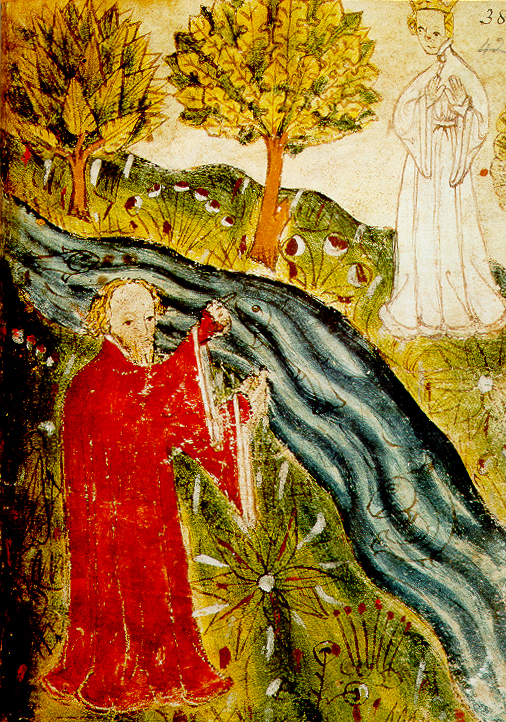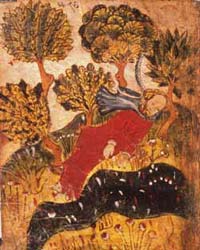Overview of Pearl and Discussion Questions
"I am in trouble with Blackwell who has set up my translation of Pearl, and needs corrections and an introduction. I am in trouble with the widow of Professor E.V. Gordon of Manchester, whose posthumous work on Pearl I undertook, as a duty to a dead friend and pupil, to put in order; and I have failed to do my duty."
--Letter to Stanley Unwin ca. 18 March 1945
"The poem is very well-known to mediævalists; but I never agreed to the view of scholars that the meterical form was almost impossibly difficult to write in, and quite impossible to render in modern English. NO scholars (or, nowadays, poets) have any experience in composing themselves in exacting metres. I made up a few stanzas in the metre ["The Nameless Land"] to show that composition in it was not at any rate 'impossible' (though the result might today be thought bad). The original Pearl was more difficult: a translator is not free, and this text is very hard in itself, often obscure, partly from thought and style, and partly from corruptions of the only surviving MS."
-- Letter to Jane Neave, 18 July 1962
"Pearl is, of course, about as difficult a task as any translator could be set. It is impossible to make a version in the same metre close enough to serve as a 'crib'. But I think anyone who reads my version, however learned a Middle English scholar, will get a more direct impression of the poem's impact (on one who knew the language). But truthfully it is I suppose just a private amusement."
--Letter to his grandson, Michael George Tolkien, 6 January 1965


ThePearl Grieved and the Dream Begun
- (stanzas 1-5) The narrator is lost in his grief over his dead child, his Pearl, and he debates within himself whether to be comforted as Christ urged.
- (stanzas 6-13) He enters a dream where he beholds a beautiful celestial garden across a river. "O Lord! the wealth of its wonderment!"
- (stanzas 14-20) He recognizes a maid, his lost Pearl, in that place, and her pearl-like beauty is detailed.
Catechism for the Dreamer
The bulk of the poem is a long dialogue in which the maid answers the questions of her earthly father. She instructs him in an often dispassionate, rational manner, though at times her emotions are aroused in regard to Mary's character and for Christ, her mystical husband and savior. Three of her responses are quite extensive:
- her retelling of the parable of the hirelings (Matt 20:1-16);
- her discussion of redemption, innocence, and reward;
- her recounting of the Apocalypse of John's description of the 144,000 and the New Jerusalem (Rev chapters 14; 21-22)
Narrator
- Are you the Pearl that I lost? I have been deeply grieved. (stanza 21)
- He rejoices that he has found her and can be with her. (24)
- He commits himself to God, yet reflects that his child has ever brought him bliss and grief. He continues in grief, while she in bliss. (31-33)
- He has great hope. Then does your merit outweigh Mary's? (36)
- But should you be a queen who only died at age two without training or growth in righteousness? (40-41)
- But can this principle be just? Doesn't God reward us according to our just merits? (50)
- Whoever made you and your raiment is wise indeed. (63)
- What kind of Lamb can this be who could call you and set you in such fame? Did Christ choose you alone? (65)
- Where is this Jerusalem ? Take me to it. (76-68)
Pearl
- Your Pearl was never lost; Paradise is a safer place to keep me. (stanzas 22-23)
- He is mistaken to think she dwells in this place, that he can be with her, or that he can cross the river. One must die to cross over. (25-27)
- May bliss be yours, especially in knowing that Pearl dwells in the land beyond pride. I am a queen/bride of heaven. (34-35)
- No. We are all royalty in Paradise without envy, and Mary is the Queen of Courtesy. All are members of Christ's mystical Body and, thus, in unity. (37-39)
- She recounts at length the parable of the Hirelings to stress that the first shall be last in the economy of heaven. (42-49)
- Yes and No. All are rewarded equally by God's free pardon of our sin. We are made innocent by grace, which comes to us from Christ's cross and is mediated by baptism, though we must truly repent with remorse. Remember that Jesus bid the children come, and we enter the kingdom (including heaven) like a child. (51-62)
- My Lamb called me to himself and made me clean in his virginity. (64)
- In answer to this question, Pearl details the apocalyptic account of the 144,000 and the New Jerusalem. The Lamb is the one who died in Jerusalem for us all. Thus, those in Paradise always wish for their number to be added to. The Lamb is spotless and brings great joy as evidenced by the Mass and by the worship in heaven. (66-75)
- The two Jerusalems are both places of peace: the first because Christ made peace there with God for us; the second because only peace is found there. (79-80)
Beholding the Celestial City & Awakening
(stanzas 81-82) He is forbidden to go to the New Jerusalem until he dies, but he may be granted a vision of it.
(stanzas 83-96) He describes the blessed city- its jeweled foundations; its procession of worshippers before the seven-horned Lamb with a bleeding side; and his Pearl among the worshippers.
(stanzas 97-101) He desperately tries to cross the river, only to awake in sorrow robbed of his vision, but with new resolve to serve the Christ. May Jesus' expression in the Eucharist make us all pure pearls.
Discussion Questions
- How does the poem Pearl function as an extended exercise in the interpretation of Scripture, especially the Gospels, the Psalms, Isaiah, and the Revelation of John?
- Are the answers that Pearl gives her father enough in regard to his grief? Do you agree with them?
- How would you describe the soteriology of the poem?
- How does the poet weave together biblical imagery and reflection?
- How is Tolkien's element of fantasy present in the poem?
- How are the elements of recovery, escape, and consolation present in the poem?
- Could Pearl be described as possessing eucatastrophe? Why or why not?
- Look over the quotations above from Tolkien's letters. What do you think Tolkien's final view of his translation of the poem was?
